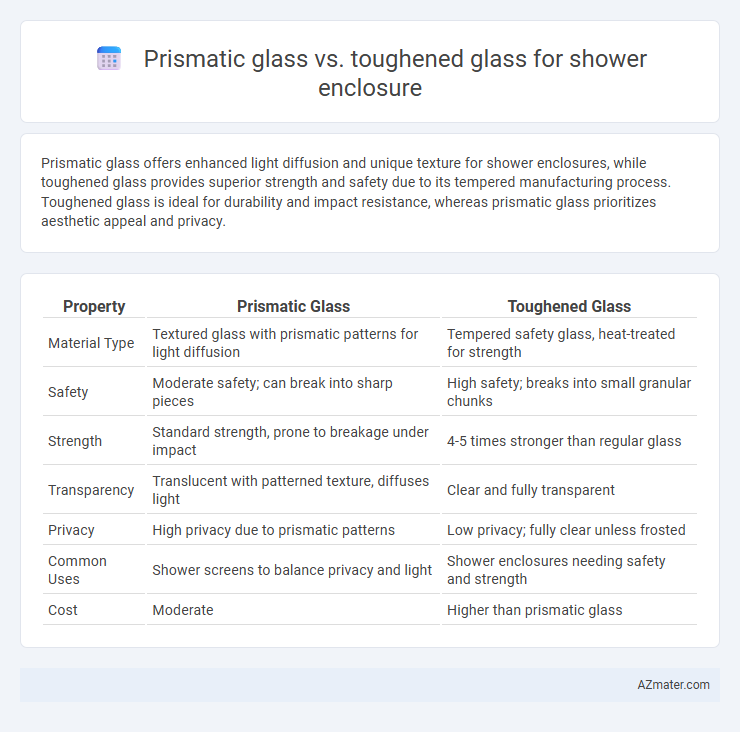Prismatic glass offers enhanced light diffusion and unique texture for shower enclosures, while toughened glass provides superior strength and safety due to its tempered manufacturing process. Toughened glass is ideal for durability and impact resistance, whereas prismatic glass prioritizes aesthetic appeal and privacy.
Table of Comparison
| Property | Prismatic Glass | Toughened Glass |
|---|---|---|
| Material Type | Textured glass with prismatic patterns for light diffusion | Tempered safety glass, heat-treated for strength |
| Safety | Moderate safety; can break into sharp pieces | High safety; breaks into small granular chunks |
| Strength | Standard strength, prone to breakage under impact | 4-5 times stronger than regular glass |
| Transparency | Translucent with patterned texture, diffuses light | Clear and fully transparent |
| Privacy | High privacy due to prismatic patterns | Low privacy; fully clear unless frosted |
| Common Uses | Shower screens to balance privacy and light | Shower enclosures needing safety and strength |
| Cost | Moderate | Higher than prismatic glass |
Introduction to Shower Enclosure Glass Options
Prismatic glass offers a textured surface that enhances privacy by diffusing light while maintaining brightness in shower enclosures. Toughened glass, also known as tempered glass, provides superior strength and safety by undergoing heat treatment to resist impact and shatter into small, blunt pieces if broken. Choosing between prismatic and toughened glass depends on the balance of aesthetic preference, privacy needs, and durability required for the shower enclosure.
What is Prismatic Glass?
Prismatic glass is designed with a textured pattern that refracts light, creating privacy without sacrificing natural brightness, making it ideal for shower enclosures. Unlike toughened glass, which is heat-treated for enhanced strength and safety, prismatic glass focuses on visual obscurity and decorative appeal. Its ability to diffuse light while maintaining durability offers a unique balance between aesthetics and functionality in bathroom spaces.
What is Toughened Glass?
Toughened glass, also known as tempered glass, is a type of safety glass specifically designed for shower enclosures by undergoing a controlled thermal or chemical treatment process that increases its strength compared to normal glass. This heat strengthening process causes the glass to shatter into small, blunt pieces rather than sharp shards, significantly reducing the risk of injury. Toughened glass offers superior resistance to thermal stress and impact, making it an ideal choice for durable, safe shower doors and panels.
Aesthetic Differences between Prismatic and Toughened Glass
Prismatic glass offers a textured, patterned surface that diffuses light and creates a decorative, visually dynamic effect, enhancing privacy while adding a sophisticated, artistic touch to shower enclosures. Toughened glass, being smooth and clear or frosted, provides a sleek, minimalist aesthetic with high transparency and strength, emphasizing modern elegance and clean lines. The choice between prismatic and toughened glass influences the enclosure's overall design impact, balancing decorative appeal with straightforward durability.
Strength and Durability Comparison
Prismatic glass for shower enclosures offers a unique textured surface that enhances privacy but generally has lower impact resistance compared to toughened glass. Toughened glass undergoes a thermal tempering process, increasing its strength up to five times that of regular annealed glass, making it highly resistant to breakage and thermal stress. In terms of durability, toughened glass is the superior choice for shower enclosures due to its enhanced shatter resistance and longevity under daily moisture exposure.
Safety Features of Prismatic vs Toughened Glass
Prismatic glass enhances safety in shower enclosures by diffusing light to reduce glare and prevent accidental impacts, while toughened glass offers superior strength and shatter resistance, breaking into small, blunt pieces to minimize injury risk. Toughened glass undergoes thermal or chemical treatments making it up to five times stronger than regular glass, ideal for withstanding daily bathroom hazards. Prismatic glass's textured surface improves visibility and slip prevention but does not match the impact resistance and breakage safety of toughened glass.
Maintenance and Cleaning Requirements
Prismatic glass features a textured surface that can trap soap scum and mineral deposits, requiring more frequent cleaning with non-abrasive solutions to maintain clarity. Toughened glass, being smooth and tempered, resists scratches and stains, making it easier to clean with standard glass cleaners and reducing maintenance time. Both types benefit from regular wiping to prevent buildup, but toughened glass generally offers lower overall maintenance needs in shower enclosures.
Cost Analysis: Prismatic Glass vs Toughened Glass
Prismatic glass typically costs more than toughened glass due to its specialized surface texture that enhances light diffusion and privacy, making it ideal for aesthetic-focused shower enclosures. Toughened glass, known for its durability and safety features, offers a more budget-friendly option with widespread availability and standard manufacturing processes. Cost analysis reveals that while prismatic glass increases upfront expenses by 15-30%, toughened glass reduces replacement and maintenance costs in the long term due to its resilience.
Suitability for Modern Shower Enclosure Designs
Prismatic glass offers excellent light diffusion and privacy, making it ideal for modern shower enclosures that prioritize aesthetics and subtle elegance. Toughened glass provides superior strength and safety, suited for frameless, minimalist designs where durability and clear visibility are essential. Choosing between prismatic and toughened glass depends on balancing privacy needs with contemporary design preferences in shower enclosures.
Which Glass Type is Best for Your Shower Enclosure?
Prismatic glass offers a textured surface that enhances privacy while diffusing light effectively, making it ideal for shower enclosures where discretion is important. Toughened glass provides superior strength and safety, as it is heat-treated to resist impacts and shatter into small, less harmful pieces if broken. For optimal durability and security in a shower enclosure, toughened glass is generally the best choice, whereas prismatic glass is preferred for aesthetic appeal and moderate privacy.

Infographic: Prismatic glass vs Toughened glass for Shower enclosure
 azmater.com
azmater.com